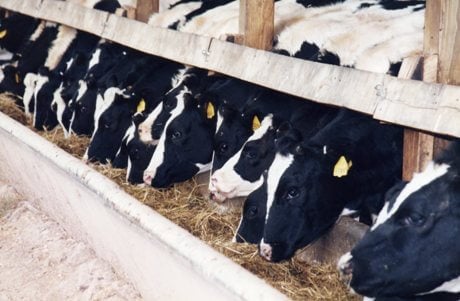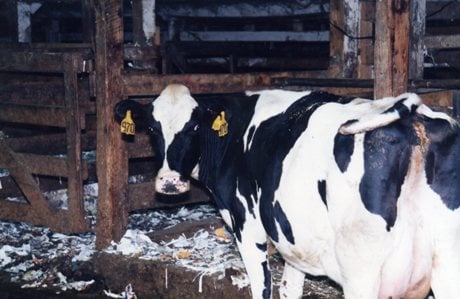His name is Freddie. About a year ago, he was just a number—one of the 30 million anonymous cows slaughtered for their flesh and skin in the U.S. every year. Today, he’s a poster cow for eating vegan.
Freddie became famous when he made a break for it while being unloaded from a truck at a slaughterhouse in Queens, New York, and bolted down a busy street. He was quickly rounded up by police and returned to the slaughterhouse. But by then, his story had gone viral and captured the public’s imagination. New York musician Ramona Montañez expressed the sentiments of many with her tweet: “Let the cow live!”
The cow—technically a steer—did live, thanks to Mike Stura, founder of Skylands Animal Sanctuary & Rescue in New Jersey, who drove to the slaughterhouse and waited outside all night in his truck to make sure he was there first thing in the morning when workers arrived. His patience paid off: The slaughterhouse owner agreed to spare the young steer.
“It’s nice if one lives once in a while,” said Stura.
Freddie had been earmarked for a family who was planning to use his flesh for a “special event,” and another cow will probably be killed in Freddie’s place—unless the family decides to serve only vegan food at its big do.
Sound unlikely? Perhaps, but it’s almost certain that many of the millions of people who heard Freddie’s story are looking at their T-bones and hamburgers in a new light. That steak used to be a someone—someone who didn’t want to die.
We don’t like to give much thought to the billions of animals killed for food every year. It’s easier to pretend that they don’t suffer when the killing goes on behind closed doors, far away from our kitchen tables, where we can’t see the terror in their eyes or hear their screams of protest. We don’t like to think about their slaughter: how they are shot in the head with a captive-bolt pistol, are shackled by a hind leg and hoisted up in the air, have their throats slit, and are eviscerated and dismembered—all while fully conscious if the captive-bolt gun happens to be off the mark, as it often is on high-speed automated slaughter lines that kill 19,000 animals every minute.
But when we’re brought face to face with our “dinner,” as people in Queens were, most of us realize that this animal is not a walking entrée—he’s an individual who has feelings, just as our dogs and cats do … just as we do.
People who’ve never met a cow like Freddie in person often pretend that cows are stupid, because that makes them feel better about eating them. But cows aren’t stupid. They’re known for their problem-solving capabilities, as well as for being gentle, inquisitive, sociable, amiable and trusting. If their trust in us is misplaced, that reflects badly on us, not them.
Maybe the humans who insist—all evidence to the contrary—that eating meat doesn’t hurt animals (or the planet or our health) are the slow-witted ones. In her book, Do Unto Animals, author Tracey Stewart writes movingly about hearing mother cows on a dairy farm crying for their calves, who’d been taken away to be sold for veal. “Sometimes you have to listen a little harder to understand what an animal is trying to say,” she writes. “And sometimes they are saying it so loudly it’s hard to imagine people don’t hear.”






